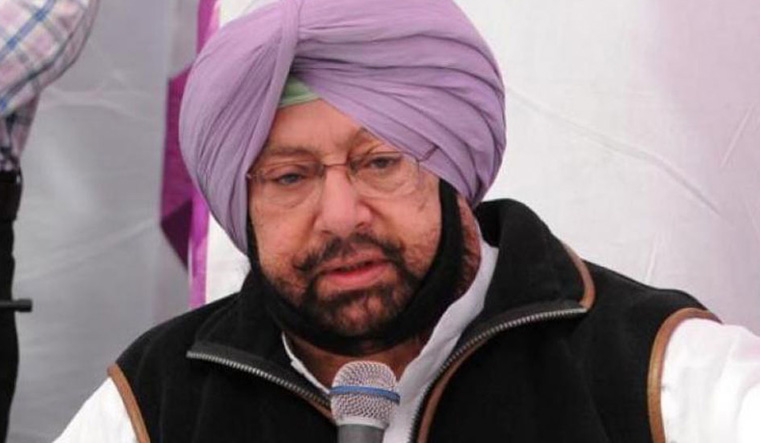The war against drugs was second in the priority of Punjab Chief Minister Capt Amarinder Singh and the party manifesto when he was leading the Congress in the assembly election campaigns last year. The first had to be water—to ensure Punjab's water was only for the people of Punjab.
The Congress had spoken of zero tolerance for smugglers, peddlers, police officials, politicians and bureaucrats of any rank or the public who indulge in drugs trafficking. The manifesto also promised to hit at the underbelly of drug supply, distribution and consumption, ending all this within four weeks of assuming office.
Sixteen months since he became the chief minister, it now seems to be the single point around which the entire state government of Capt Singh is focused. Such has been the widespread impact of the drug abuse in the state.
The Punjab cabinet met to address this issue on Monday. The meeting called for stronger laws against drug peddlers and smugglers by the Centre. It unanimously decided to seek the Centre's help to tackle the menace.
On Wednesday, the chief minister wrote to Union Home minister Rajnath Singh, communicating the cabinet's recommendation, and sought amendment of the Narcotic Drugs and Psychotropic Substances Act, 1985, which while providing death penalty for a second time offence, lets off the first time offenders. “This means that a person can indulge in these nefarious activities and get away at least once, causing substantial damage to the youth and the society,” he lamented. His government, said Captain Amarinder Singh, felt that this should not be allowed to happen and even first-time offenders should be awarded death penalty for offences that are clearly elaborated under Section 31A of the NDPS Act, 1985.
“We have come to this conclusion after a comprehensive discussion and feel that resultant deterrence of provisions of death penalty in the Act ibid, will help us in effectively containing if not eliminating the drug peddlers and mafia operating not only in Punjab, but also in other parts of the country,” he elaborated. “Given the magnitude of the problem, which had been denied during the last many years, these enforcement measures though yielding results, need to be further strengthened. In this direction, it is felt that the existing drug prevention and control laws should be revisited to provide for more deterrent punishment to the offenders,” Capt Amarinder Singh wrote.
He mentioned the measures already taken by his government to enforce the existing laws to prevent drug abuse as also to ensure rehabilitation and de-addiction of those who indulge in it. “The intensive action plan unfolded and executed by us during the last over a year has resulted in arrest of 18,977 drug peddlers and treatment of more than 2 lakh drug victims,” he has pointed out. The chief minister said more than 3,977 NDPS convicts and 5,610 NDPS undertrials were in different prisons of the state.
He also mentioned the Drug Abuse Prevention Officers’ Prevention (DAPOs) Programme, which is aimed at effective participation of civil society in prevention of drug abuse in the state.
The chief minister also pointed out that drug dealing and peddling has caused serious strains on the state’s human and economic resources. “These are being realised as major obstacles in the state’s socio-economic development. The menace of drugs is affecting the present generation of youth not only in Punjab, but also in the neighbouring states.”
On Thursday, he decided to deal with the drug menace by taking drastic measures if need be. Believing that it is a widespread problem cutting across social and other strata, he decided that all government employees and police personnel should undergo a dope test periodically.
The mandatory dope test will be for all government employees, including police personnel, from the time of recruitment through every stage of their service. It will also be part of the annual medical exam that certain employees are required to undergo in accordance with the nature of their duties.
also read
- Kejriwal not given amenities provided even to hardcore criminals: Punjab CM Mann
- Breather for flora and fauna of Sukhna sanctuary as eco-sensitive zone set to be demarcated
- Punjab: Why BJP's decision to step out of Akali Dal's shadow is a tactical move
- Why Shiromani Akali Dal-BJP alliance failed to materialise in Punjab
Predictably, all sections are howling. More so because politicians and legislators have been exempted from the test.
The chief minister also urged NCC cadets to get involved in the fight against drugs.
On Friday, Capt Singh said he had no problem taking the dope test—a challenge flung at him by political rivals—but said he would leave it to the conscience of other elected representatives to take their own decision.
About 30 deaths allegedly linked to drug abuse have been reported in the state in the month of June, and the AAP and the SAD are leaving no opportunity to come down on the government for failing to curb the drug menace, within four weeks, as promised in the Congress manifesto.
A special task force has been set up, but nothing much has come of it.
But it is not an easy war. For, even as the chief minister was talking about dope tests and death penalty for traffickers,the Justice Mehtab Singh Gill Commission, has sought the cancellation of 24 cases under the NDPS Act, saying they were falsely charged. The Commission was set up last year to probe the implication of innocent people in the drug trade during the 10-year SAD-BJP rule.
Meanwhile, a government notification on the dope test for government employees is on the anvil.


